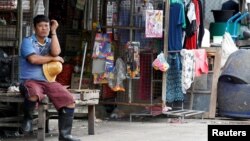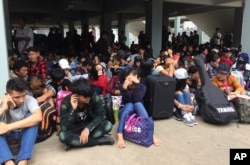Human rights and migrant assistance groups in Thailand say Myanmar migrant workers of Muslim and South Asian heritage have faced barriers in proving Myanmar nationality which is a required step in gaining legal status in Thailand.
Many have been unable to satisfy requests from Myanmar consular staff for extra documents that are not demanded from members of other ethnic and religious groups, in order to obtain Myanmar-issued Certificates of Identity required for Thai visas and work permits.
This has left them with the choice of returning to Myanmar to get the requested documents — going through expense and the risk of interrogation by Myanmar police — staying in Thailand where they face arrest as illegal migrants, or paying exorbitant fees to brokers in attempts to circumvent the barriers.
Migrants of all backgrounds were caught in a rush to regularize their status before March 31, when cards issued by the Thai government since 2014, granting the temporary right to stay and work, expired. One Stop Service Centers, hosting Myanmar and Thai officials, were set up across Thailand to speed up the process.
An official at the Myanmar Ministry of Labor, Immigration and Population, who asked not to be named because he wasn’t authorized to speak to the media, did not deny the extra scrutiny being applied to Muslims and other groups but said details could only be obtained from the Ministry of Home Affairs. Officials at this ministry refused comment.
Taken by surprise
The British-registered Burma Human Rights Network (BHRN), after interviewing Myanmar migrants in Chiang Mai Province, said, “Burmese Muslims, as well as Hindu and Buddhist Burma-born Gurkhas of Nepali ancestry, are being required to prove their citizenship by presenting additional documents.”
These include standard Myanmar-issued ID cards, household registration forms, and letters from both the police and local officials in Myanmar. According to BHRN, members of other groups could merely present their Thai-issued temporary cards, along with a letter from their employers and proof of residency in Thailand.
Brahm Press, director of the Thailand-based Migrant Assistance Program Foundation, known as MAP, told VOA they had been “taken by surprise on this issue,” and confirmed that Myanmar migrants with Muslim and South Asian backgrounds were struggling to meet the extra demands from officials.
Preeda Tongchumnum, of the Migrant Working Group, a Thailand-based coalition of NGOs and aid agencies promoting migrant rights, told VOA that Myanmar Muslim migrants were facing the same difficulties in Mae Sot and to a lesser extent in Ranong, both near the Myanmar border.
Citizenship
Min Min, a recruitment agent with the Aye Linn Latt Htut Company, based in the Myanmar border town of Myawaddy, told VOA, “Yes, Muslims need more documents than other people. […] Ethnic groups like Mon, Karen, or Pa-O are fine.”
Johny Adhikari, secretary of the Thai-Based Myanmar-Born Gurkha Youth Association, which represents Myanmar migrants of Nepali descent, who identify as “Gurkha” and are mostly Hindu or Buddhist, told VOA, “Many Gurkhas are not getting CIs [Certificates of Identity].”
He said many have “at least one” of the requested Myanmar-issued documents but not the full set, adding that brokers were offering to help navigate the process for 12-18,000 THB ($380-580), a high sum for migrants in mostly low-paying jobs.
Under Myanmar citizenship law, only members of officially recognized ethnic groups are automatically eligible. This marginalizes the large communities of Indian, Nepali, and Chinese descent, who have been stigmatized by Myanmar nationalists since the colonial era and who continue to face barriers to citizenship.
Risks on return
A Royal Thai decree, which came fully into force at the start of this year, mandates fines and prison sentences of up to five years for migrants working without a valid permit, and steeper penalties on employers who hire them.
Migrants whose applications remain pending now have until the end of June to regularize their status. According to the Thai Labor Minister, quoted in the Bangkok Post on April 2, 59,217 out of 1,379,252 applicants had failed registration and must leave Thailand.
However, the Migrant Working Group said it expected 900,000 would not be able to complete the process. Thailand’s migrant community is estimated at more than 3 million, the majority being from Myanmar and without formal immigration status.
Some among the Myanmar Muslim migrant community fled persecution in Myanmar and face grave risks on returning.
A March 27 post on an official Myanmar Police Facebook page announced the arrest on March 25 in Myawaddy of three Muslims from a group of 173 migrant workers returning to Myanmar.
Two men and one woman, shown in a police snapshot, were charged with immigration offences for leaving Myanmar by sea from northern Rakhine State in 2012 — a time when Muslims were uprooted by communal riots in the state — and returning to Myanmar “without permission.”
Aung Naing Soe contributed to this report.





